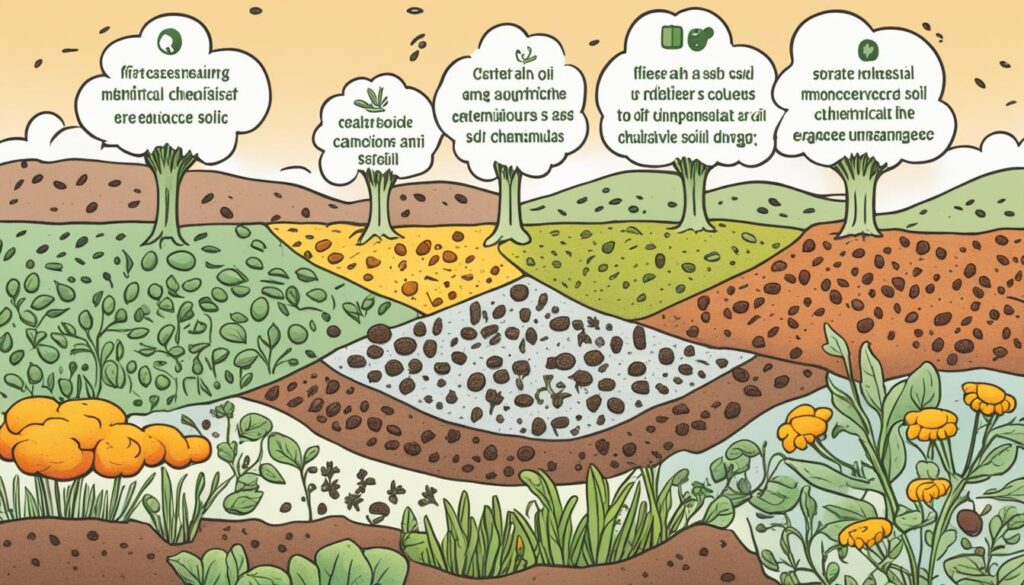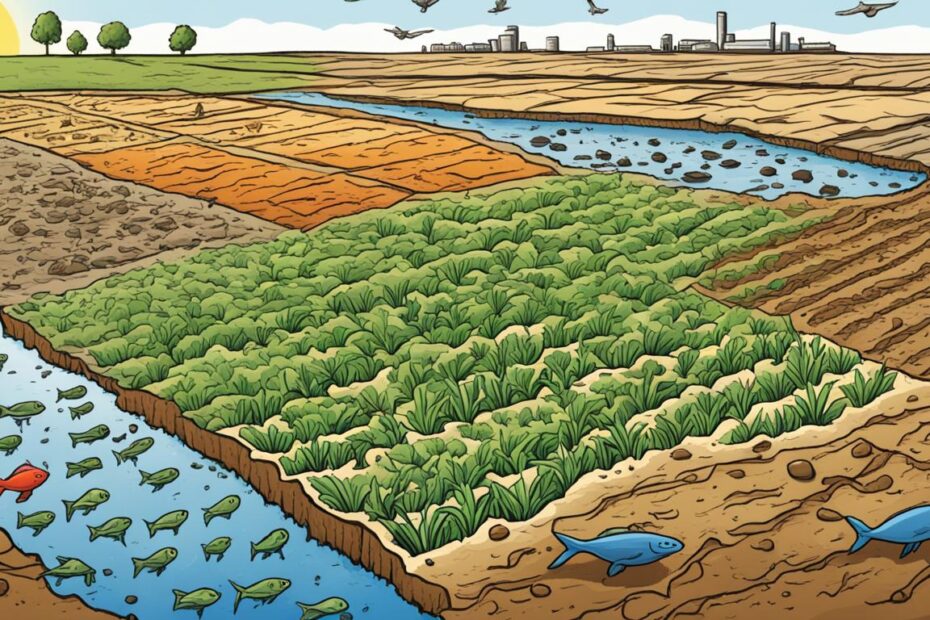Chemical fertilizers have been hailed as a boon to agricultural productivity since the 1930s. But are they really as beneficial as we’ve been led to believe? Are there hidden dangers that we need to be aware of?
In this article, we will reveal the negative effects of chemical fertilizers and explore the long-term impacts they can have on the environment and human health. From groundwater contamination to crop damage, we will dive deep into the alarming consequences of these widely used fertilizers.
So, are you ready to uncover the truth behind chemical fertilizers and make more informed choices for a greener future? Let’s delve into the surprising realities.
Key Takeaways:
- Chemical fertilizers can contaminate groundwater, leading to water pollution.
- Excessive use of chemical fertilizers contributes to air pollution and climate change.
- Chemical burns to crops and soil acidification are some of the negative impacts on crop health and soil quality.
- Consuming crops grown with chemical fertilizers may result in nutrient-poor food, impacting human health.
- Sustainable and organic alternatives offer a greener and more sustainable approach to agriculture.
What Are Chemical Fertilizers and How Do They Work?
Chemical fertilizers are composed of inorganic materials that undergo chemical treatments to create precise formulations of nutrients, primarily nitrogen, phosphorus, and potassium (NPK). These macronutrients are essential for plant growth and are present in higher concentrations in chemical fertilizers compared to organic fertilizers. Chemical fertilizers offer farmers more control over crop production and are cost-effective, making them a popular choice.
However, the high nutrient content and imbalanced formulations can lead to unintended consequences and negative effects on soil health.
Did you know?: Organic fertilizers, on the other hand, provide nutrients in a more balanced and gentle manner, promoting long-term soil health and minimizing environmental harm.
To better understand the nutrient content of chemical fertilizers, let’s take a closer look at the three primary macronutrients they provide:
| Nutrient | Chemical Fertilizers | Organic Fertilizers |
|---|---|---|
| Nitrogen (N) | High concentration | Lower concentration |
| Phosphorus (P) | High concentration | Varies depending on source |
| Potassium (K) | High concentration | Varies depending on source |
As shown in the table above, chemical fertilizers contain higher levels of nitrogen, phosphorus, and potassium compared to organic fertilizers. This high nutrient content offers immediate and concentrated benefits to plants, stimulating growth and crop production.
However, the imbalanced formulations of chemical fertilizers can result in excess nutrients that may not be fully absorbed by plants, leading to environmental issues such as groundwater contamination and water pollution.
CLICK HERE TO CHECK OUR RECOMMENDED PRODUCTSEnvironmental Issues with Chemical Fertilizers
One of the major concerns with chemical fertilizers is their potential to contaminate groundwater and water sources. When applied to fields, excessive amounts of nitrogen from fertilizers can seep into the soil and eventually reach water bodies, leading to water pollution. The nutrient overload can promote excessive growth of aquatic plants, depleting oxygen levels in the water and causing harm to fish and other aquatic life.
Additionally, the increased use of chemical fertilizers contributes to air pollution by releasing greenhouse gases into the atmosphere, such as carbon dioxide and nitrous oxide, which have a significant impact on climate change.
These environmental issues highlight the need for sustainable farming practices and the use of organic fertilizers. By reducing reliance on chemical fertilizers, we can help minimize groundwater contamination, water pollution, and air pollution, taking significant steps toward a greener and healthier future for our planet.
Impact on Crop Health and Soil Quality
Chemical fertilizers, when overused or improperly applied, can cause chemical burns to crops. The high nutrient content, particularly nitrogen, can lead to leaf scorching and damage the overall health of plants, resulting in reduced crop yield and poor quality produce. Furthermore, the excessive use of chemical fertilizers can lead to the acidification of the soil.
Nitrogen in fertilizers lowers the pH of the soil, making it more acidic. This acidic soil, in turn, reduces the availability of certain nutrients, such as calcium and magnesium, which are vital for plant growth. As a result, plant roots struggle to absorb these essential nutrients, resulting in stunted growth and decreased crop yields. The long-term consequences of soil acidification pose a significant challenge to sustainable agriculture.
To illustrate the impact of chemical burns on crops and soil acidification, consider the following table:
| Crop | Chemical Burns | Soil pH |
|---|---|---|
| Tomatoes | Leaves show signs of scorching and necrosis, leading to reduced fruit quality. | Acidic (pH 5.5) |
| Wheat | Yellowing of leaves and stunted growth. | Acidic (pH 6.0) |
| Corn | Wilting and reduced cob size. | Acidic (pH 5.8) |
As evident from the table above, chemical burns to crops and soil acidification can have severe consequences on crop health and overall productivity. It is important to adopt sustainable practices and alternative fertilization methods to prevent these issues and promote soil health.
Human and Animal Health Concerns
The use of chemical fertilizers can have significant implications for human and animal health. While these fertilizers are effective in increasing crop production, they often result in crops with reduced nutritional value, compromising food quality. Chemical fertilizers primarily prioritize fast growth, leading to crops that may lack essential nutrients like calcium, zinc, and iron.
This nutrient depletion in crops can have detrimental effects on human health. Consuming nutrient-poor foods over time can contribute to malnutrition and a range of health issues, including deficiencies in vital minerals and vitamins. As a result, the use of chemical fertilizers raises concerns about the long-term impact on human well-being.

“The use of chemical fertilizers may compromise the nutrient content in crops, leading to reduced food quality and potential health risks for consumers.” *
Furthermore, the potential contamination of food crops with chemical residues is another critical concern. Chemical fertilizers can leave behind residues that can accumulate in crops and pose risks to human health. These residues may include harmful chemicals such as pesticides or heavy metals, which can have toxic effects when consumed.
It’s important to note that the use of chemical fertilizers not only affects humans but also impacts the health and well-being of animals in agricultural systems. Animals that rely on crops grown with chemical fertilizers may also experience nutrient deficiencies, affecting their overall health and productivity.
| Concerns | Effects on Human Health | Effects on Animal Health |
|---|---|---|
| Nutrient depletion | Increased risk of malnutrition and health issues due to reduced nutritional value in crops | Nutrient deficiencies affecting the overall health and productivity of animals |
| Contamination of food crops | Risk of consuming chemical residues, potentially leading to toxic effects | Risk of consuming chemical residues, potentially affecting animal health |
Key Takeaway:
The use of chemical fertilizers can lead to reduced food quality, nutrient depletion in crops, and potential health risks for both humans and animals. It is crucial to prioritize sustainable and organic alternatives to avoid these negative consequences and ensure the well-being of both consumers and agricultural systems.
* Quote for illustrative purposes only.
CLICK HERE TO CHECK OUR RECOMMENDED PRODUCTSThe Importance of Sustainable and Organic Alternatives
To mitigate the negative effects of chemical fertilizers, it is crucial to consider sustainable and organic alternatives. By embracing these alternatives, you can contribute to a greener and more sustainable agricultural system, reduce your dependence on chemical fertilizers, and promote long-term soil health.
Sustainable Farming Practices
Sustainable farming practices such as crop rotation, cover cropping, and integrated pest management play a vital role in maintaining soil health and fertility without relying heavily on chemical inputs. Crop rotation involves planting different crops in the same area over time, which helps break pest cycles and improves soil structure. Cover cropping involves growing specific plants during fallow periods, which helps prevent soil erosion, adds organic matter, and improves nutrient availability. Integrated pest management focuses on biological control methods and reduces the need for chemical pesticides, ensuring a well-balanced ecosystem within your farm.
Organic Fertilizers
Organic fertilizers derived from natural sources like animal manure and compost provide nutrients in a more balanced and gentle manner. They promote long-term soil health by improving soil structure, enhancing nutrient retention, and stimulating the activity of beneficial soil microorganisms. Organic fertilizers also minimize the risk of nutrient runoff and groundwater contamination, making them an environmentally friendly choice.
Organic fertilizers improve the overall health and vitality of your crops, leading to higher-quality yields. They provide a diverse array of nutrients, including essential micronutrients, that contribute to the nutritional value of the produce. Additionally, organic fertilizers release nutrients slowly, ensuring a steady supply throughout the growing season and reducing the risk of nutrient imbalances or excesses.
The Benefits of Sustainable and Organic Alternatives
Sustainable farming practices and organic fertilizers promote long-term soil health, reduce environmental harm, and enhance the overall quality and nutritional value of your crops.
By adopting these alternatives, you are not only taking steps towards a more sustainable future but also ensuring the continued success of your farming operation. They offer a balanced approach that supports both the health of the environment and the productivity of your farm. Make a conscious choice to prioritize sustainable farming and organic fertilizers, and let your actions contribute to a brighter and healthier world for generations to come.
| Benefits of Sustainable and Organic Alternatives |
|---|
| Promotes long-term soil health and fertility |
| Reduces dependence on chemical fertilizers |
| Minimizes environmental harm |
| Enhances crop quality and nutritional value |
| Improves soil structure, nutrient retention, and water-holding capacity |
| Supports a diverse and beneficial soil microbiome |
| Reduces the risk of groundwater contamination and nutrient runoff |
| Contributes to a sustainable and resilient food production system |
Microbial Communities and Soil Health
The proper functioning of microbial communities in the soil is vital for maintaining soil health and nutrient cycling. However, the use of chemical fertilizers can disrupt the delicate balance of these communities, leading to detrimental effects on soil health.
Microbes in the rhizosphere, the area surrounding plant roots, play a crucial role in nutrient availability and uptake. They help break down organic matter, releasing essential nutrients that plants can absorb. Additionally, these microbial communities contribute to soil structure, improving water retention and preventing erosion.
Unfortunately, the excessive use of chemical fertilizers can harm these beneficial microbial communities. These fertilizers often contain high concentrations of nutrients that are quickly available to plants. While this may lead to rapid growth, it does not support the development of diverse microbial populations.
Organic fertilizers, on the other hand, provide a more balanced and gradual release of nutrients, fostering the growth of a diverse and beneficial soil microbiome.

The diverse microbial communities supported by organic fertilizers help enhance soil health in multiple ways. They break down organic matter, releasing nutrients slowly over time, which enhances nutrient availability for plants and reduces the risk of nutrient leaching. These microbes also improve soil structure by binding soil particles together, creating spaces for air and water movement.
“The soil is the stomach of the plant.” – Sir Albert Howard
Promoting a Healthy Soil Microbiome
To foster a healthy soil microbiome and promote sustainable agricultural practices, farmers can shift towards the use of organic fertilizers. These fertilizers, derived from natural sources like compost and animal manure, provide essential nutrients in a manner that mimics natural nutrient cycling processes. By adopting organic fertilizers, farmers can:
- Support the growth of diverse microbial communities in the soil
- Enhance nutrient cycling and availability
- Improve soil structure and water holding capacity
- Reduce the environmental footprint associated with chemical fertilizers
Incorporating organic fertilizers into agricultural practices can contribute to the long-term sustainability of our food production systems while minimizing the negative impacts of chemical fertilizers.
Conclusion
The negative effects of chemical fertilizers on the environment and human health are well-documented. Groundwater contamination, waterway pollution, air pollution, chemical burns to crops, and acidification of the soil are key concerns associated with their use.
To mitigate these impacts, it is important to prioritize sustainable and organic alternatives in agriculture. By adopting practices that promote soil health, reduce chemical inputs, and support diverse microbial communities, you can contribute to a greener and more sustainable future.
Embrace sustainable farming practices such as crop rotation, cover cropping, and integrated pest management to maintain soil fertility without relying heavily on chemical fertilizers. Choose organic fertilizers derived from natural sources like animal manure and compost, which provide nutrients in a more balanced and gentle manner.
By making these choices, you will not only protect the environment but also support the long-term viability of our food production systems. Together, we can work towards a greener future and ensure a healthier planet for generations to come.
FAQ
What are chemical fertilizers?
Chemical fertilizers are composed of inorganic materials that undergo chemical treatments to create precise formulations of nutrients, primarily nitrogen, phosphorus, and potassium (NPK). These macronutrients are essential for plant growth and are present in higher concentrations in chemical fertilizers compared to organic fertilizers.
What are the negative effects of chemical fertilizers on the environment?
Chemical fertilizers can lead to groundwater contamination and water pollution as excessive amounts of nitrogen from fertilizers seep into the soil and reach water bodies. Additionally, the increased use of chemical fertilizers contributes to air pollution by releasing greenhouse gases that have a significant impact on climate change.
How do chemical fertilizers impact crop health and soil quality?
Chemical fertilizers, when overused or improperly applied, can cause chemical burns to crops. The high nutrient content, particularly nitrogen, can lead to leaf scorching and damage the overall health of plants. Moreover, the excessive use of chemical fertilizers can lead to the acidification of the soil, reducing the availability of certain nutrients and negatively impacting plant growth and crop yields in the long term.
What are the human and animal health concerns associated with chemical fertilizers?
Chemical fertilizers may lead to crops with reduced nutritional value, as they primarily focus on fast growth rather than nutrient balance. Consuming nutrient-poor crops over time can contribute to malnutrition and health issues in humans. Furthermore, the potential contamination of food crops with chemical residues can pose risks to human health, and the use of chemical fertilizers can also impact the health and well-being of animals in agricultural systems.
What are the sustainable and organic alternatives to chemical fertilizers?
Sustainable farming practices, such as crop rotation, cover cropping, and integrated pest management, can help maintain soil health and fertility without relying heavily on chemical inputs. Organic fertilizers, derived from natural sources like animal manure and compost, provide nutrients in a more balanced and gentle manner, promoting long-term soil health and minimizing environmental harm.
How do microbial communities and soil health relate to chemical fertilizers?
The excessive use of chemical fertilizers can disrupt the delicate balance of microbial communities in the soil. Organic fertilizers, on the other hand, support a diverse and beneficial microbial community in the soil. These microbes help improve nutrient availability, enhance soil structure, and contribute to overall soil health.
What is the conclusion regarding the negative effects of chemical fertilizers?
The negative effects of chemical fertilizers on the environment, crop health, and human and animal health are well-documented. To mitigate these impacts, it is important to prioritize sustainable and organic alternatives in agriculture. By adopting practices that promote soil health, reduce chemical inputs, and support diverse microbial communities, we can work towards a greener future and ensure the long-term sustainability of our food production systems.
